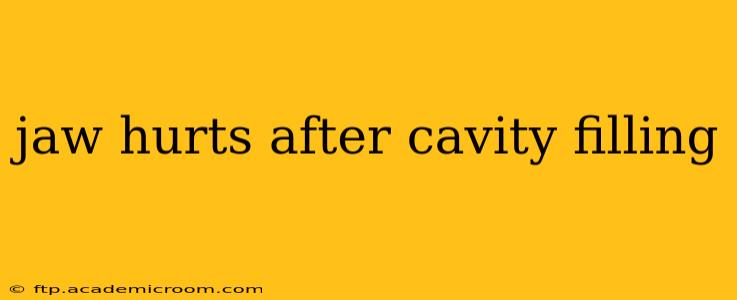Getting a cavity filled is a common dental procedure, but sometimes, jaw pain can linger afterward. This discomfort can range from mild soreness to a sharp, throbbing ache, significantly impacting your daily life. Understanding the causes of this post-filling jaw pain is crucial for effective management and preventing complications. This comprehensive guide explores the potential reasons behind your jaw ache, suggests remedies, and advises when professional dental attention is necessary.
Why Does My Jaw Hurt After a Filling?
Several factors can contribute to jaw pain after a cavity filling. The most common include:
1. Inflammation and Irritation:
The filling procedure itself involves drilling and manipulating the tooth, inevitably causing some minor trauma to the surrounding tissues. This can lead to inflammation and irritation, resulting in temporary jaw pain. The body's natural healing process usually resolves this within a few days.
2. Temporomandibular Joint (TMJ) Dysfunction:
The TMJ connects your jaw to your skull, and issues with this joint can cause pain radiating to the jaw, temples, and even ears. While not directly related to the filling, the stress of the dental procedure might exacerbate pre-existing TMJ problems or trigger a new episode. Stress from clenching or grinding your teeth during or after the procedure can also contribute.
3. High Filling:
If the filling is placed too high, it can alter your bite, leading to discomfort and jaw pain. This misalignment forces your jaw to work harder, resulting in muscle strain and pain.
4. Infection:
Although less common with modern dental practices, an infection at the filling site is a possibility. This can cause significant pain, swelling, and potentially even fever. This requires immediate professional attention.
5. Sinus Infection:
Upper teeth are close to the sinuses, and sometimes, a sinus infection can mimic tooth pain or jaw pain. This is important to rule out as the treatment differs significantly from dental-related causes.
6. Nerve Irritation:
During the filling procedure, a nerve may be inadvertently irritated. This can lead to sharp, shooting pains in the jaw. This usually subsides as the nerve heals.
How Long Does Jaw Pain After a Filling Last?
The duration of post-filling jaw pain varies significantly depending on the cause. Mild inflammation and irritation typically resolve within a few days to a week. However, pain persisting beyond a week, especially if severe or accompanied by other symptoms like swelling or fever, requires a visit to your dentist.
Home Remedies for Jaw Pain After a Filling:
While professional dental care is crucial for certain situations, several home remedies can provide temporary relief:
1. Over-the-Counter Pain Relief:
Nonsteroidal anti-inflammatory drugs (NSAIDs) like ibuprofen or naproxen can effectively reduce pain and inflammation. Always follow the recommended dosage.
2. Cold Compress:
Applying a cold compress to the affected area for 15-20 minutes at a time can help reduce swelling and numb the pain.
3. Warm Compress:
Gentle warmth can also be helpful, especially if the pain is related to muscle tension. Alternate between warm and cold compresses to find what provides the most relief.
4. Soft Foods:
Stick to soft foods that require minimal chewing to avoid further irritation of the jaw.
5. Rest:
Avoid strenuous activities and excessive jaw movements to allow the area to heal.
When to See a Dentist After a Filling:
It's crucial to contact your dentist if:
- The pain is severe or persistent (lasting more than a week).
- You experience swelling, redness, or fever.
- You notice any pus or discharge from the area.
- The pain is accompanied by numbness or tingling.
- Your bite feels off or uneven.
Ignoring persistent jaw pain could lead to more serious complications. Your dentist can assess the situation, determine the underlying cause, and provide appropriate treatment.
Conclusion:
Jaw pain after a cavity filling is a relatively common occurrence, often resolving on its own with time and simple home remedies. However, understanding the potential causes and knowing when to seek professional help is vital for ensuring a swift recovery and preventing potential complications. Always consult your dentist if you have any concerns.
